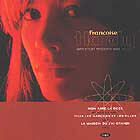Cover text :
Paris never really changes, only its people do, each within their time.
And it is in the moment of this realisation that Paris becomes a friend,
because from it arises a feeling - one that denotes a particular kind of
sensitivity and gentleness. Though it is a feeling of almost Parisian in
nature, its sentiment is one that seems to pervade most of the art in
France, particularly that of its music. Among contemporary artists in France
today, Francoise Hardy is still probably the one best noted for this quality.
Since the spring of 1960 when she first began auditioning for record
companies and was signed by Vogue Records, her name has become a byword in
the French language. Within two weeks of its release, her first record had
become the biggest hit of the year and with it she emerged as France's most
talented new artist. Though her rise in the music industry was meteoric, it
was not due merely to the praise that is usually bestowed upon an artist
by an adoring public. Another important factor was involved.
Francoise appeared in Paris at a time when the city was still very much
under the spell of Sylvie Vartan and the ensuing phenomenon that was politely
known as the Ye-Ye girls. Sylvie and her singer husband Johnny Hallyday
dominated the music scene, for they carried with them all the spangle and
glitter of that goes along with the more sensational movements in popular
music. Sylvie and Johnny were France's answer to rock and roll and the
powerful pop culture that was emerging in the United States. They were good
but the French public is a fickle one. When Francoise Hardy's first record was
released, people responded to it immediately. There was something in her music
that spangle and glitter could not provide: a simplicity, a warmth and a
tendresse that drew people to her, rather than merely attracting
them. Her songs were dreams laced with hopes and disappointments, her music a
reflection of what was happening around her as well as within. Francoise Hardy
became an artist who represented the innocence of youth. To those who heard
her, her presence was a reprieve, a gift of something that had long been
missed and was much needed.
If her songs are melancholy at times, it is a
melancholy without pretension, for much of her beauty lies in her sadness and
her honesty in her innocence.


